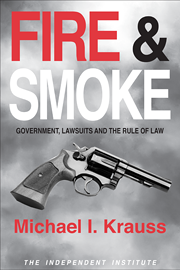First, my disclaimer: I hate tobacco. I have never smoked, do not allow smoking in my home, and think I would disown one of my children if he or she started. I believe states have the constitutional right to ban tobacco (though they would be very foolish and cruel to do so, as many Americans legally use the product and wish to continue doing so). I have never taken a cent from a tobacco company in consulting fees.
That said, the ongoing federal lawsuit against tobacco companies is an outrage against the Rule of Law and against the very idea of limited federal government. This amount demanded in the suit, inherited by the Bush administration from the Clintonistas, was last week whittled down from its original $280 billion to a “mere” $10 billion. It is past time for the administration to administer the coup de grace to this lawsuit, for it makes a mockery of our tort system.
As I indicated in my book, Fire and Smoke: Government Lawsuits and the Rule of Law, in 1997 Attorney General Janet Reno testified before the Senate that the federal government had no legal basis to recover health-care expenditures from tobacco companies. That’s why she left this task to the states, which recovered a whopping $246 billion from the industry in 1998. Yet in 1999, under pressure from a White House that had failed to enact its desired 55-cent per pack federal cigarette tax increase, Miss Reno shamelessly filed the very same suit she had explicitly admitted was groundless.
The federal suit was a legal shambles. Consider:
- Overwhelming evidence reveals tobacco manufacturers never duped the federal government. Washington has known for decades that smoking is dangerous. Since 1964, every pack of cigarettes sold in the United States has carried a federally mandated warning of the health risks of smoking. So Washington has no fraud suit against Big Tobacco.
- Nor can Washington claim it has somehow acquired individual smokers’ rights to sue. For one thing, the federal government long denied such rights exist. In 1997, the Veterans’ Affairs Department rejected, on the grounds veterans assumed the risks of smoking, a claim by former soldiers allegedly sickened by cigarettes the department furnished at no cost. Washington, it turns out, distributed free cigarettes to servicemen until 1974, a full decade after it required health warnings.
- Virtually every serious expert who has studied the issue has concluded that, while smoking is dangerous for smokers, it causes no financial loss to the federal government. This is because smoking affects the timing of government health-care costs. Smokers on average die earlier than nonsmokers, so costs paid by government to treat tobacco-related diseases are more than offset by savings on other diseases and retirement benefits. The billions in federal excise taxes each year generate a net gain to federal coffers. Washington would suffer fiscally if all Americans stopped smoking.
In a tacit acknowledgement of the weakness of its legal case, the federal lawsuit’s “Hail Mary pass,” and the only cause of action to have survived judicial scrutiny, is a RICO (Racketeer Influenced and Corrupt Organizations Act) claim. Under RICO, someone harmed by a “pattern of criminal activity” can bring a civil claim against the offending mobster.
But civil RICO damages accrue to individuals. During the debate preceding the RICO law’s enactment, a proposed amendment that would have allowed the United States to sue was withdrawn. And Washington’s examples of “racketeering” are laughable. One representative RICO charge was that the “Joe Camel” ads in Sports Illustrated constitute a pattern of criminal activity. Yet these ads were both legal and arguably constitutionally protected.
At any rate, since a February 2005 ruling by the District of Columbia Circuit U.S. Court of Appeals, it has become obvious the feds cannot recover for these RICO claims. Because of this ruling, the administration has grossly pared down its suit. Its pathetic new claim: $10 billion is still due as damages because of the risk of “future violations” of RICO by tobacco companies.
The federal tobacco suit is reported to have cost more than $135 million to prepare and prosecute. From the beginning, it was never more than a thinly veiled quest for billions in federal revenue President Clinton was unable to obtain through constitutional taxation. It epitomizes regulation by litigation, which President Bush campaigned to dismantle.
Attorney General Gonzales, please kill this suit.







